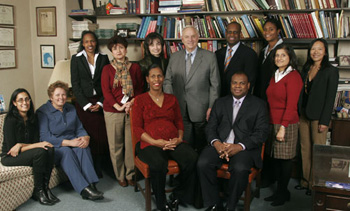DEW Point Program
 The Department's unique Division of Equity in Women's and Perinatal Medicine (DEW Point) developed by Dr. Irwin R. Merkatz promotes faculty development of culturally competent leaders to address the challenging clinical, research and educational issues that are reflected in persistent health outcome and health care delivery gaps in the United States. The "DEW Point Scholars" are the backbone of this program, reflecting the Department's plan for mentoring young faculty who will be prepared to address racial and ethnic disparities in women's and perinatal health. A superb cadre of uniquely committed and culturally diverse faculty and fellows have been chosen as DEW Point Scholars. This group of young, culturally competent, highly trained academic clinical scientists integrate sociocultural determinants of health and robust quantitative basic science and clinical research to promote effective interventions directed at health outcome disparities throughout a women's life in the Bronx.
The Department's unique Division of Equity in Women's and Perinatal Medicine (DEW Point) developed by Dr. Irwin R. Merkatz promotes faculty development of culturally competent leaders to address the challenging clinical, research and educational issues that are reflected in persistent health outcome and health care delivery gaps in the United States. The "DEW Point Scholars" are the backbone of this program, reflecting the Department's plan for mentoring young faculty who will be prepared to address racial and ethnic disparities in women's and perinatal health. A superb cadre of uniquely committed and culturally diverse faculty and fellows have been chosen as DEW Point Scholars. This group of young, culturally competent, highly trained academic clinical scientists integrate sociocultural determinants of health and robust quantitative basic science and clinical research to promote effective interventions directed at health outcome disparities throughout a women's life in the Bronx.
DEW Point Scholars have included Garfield Clunie, MD, Nereida Correa, MD, Ashlesha Dayal, MD, Marsha Guess, MD, Gloria Huang, MD, Dineo Khabele, MD, Genevieve Neal-Perry, MD, PhD, Lubna Pal, MD, Setul Pardanani, MD, Wendy Wilcox, MD, MPH, and Rodney Wright, MD. These DEW Point Scholars were prominently featured at the Department's annual Autumn in New York conference in November 2003, which focused on gender as well as other sub-group disparities in health outcomes.
Dr. Irwin Merkatz has said " As academic leaders, members of the Einstein community must be proactive, particularly when serving families in the diverse community of the Bronx...Our hope is that the DEW Point program will become a national model for offering women and minority physicians greater opportunities for advancement in academia and in their medical practices. Our goal is to provide an integrated training site for a significant segment of the health force of the future, and to equip them with the tools needed for providing more equitable and culturally sensitive care."